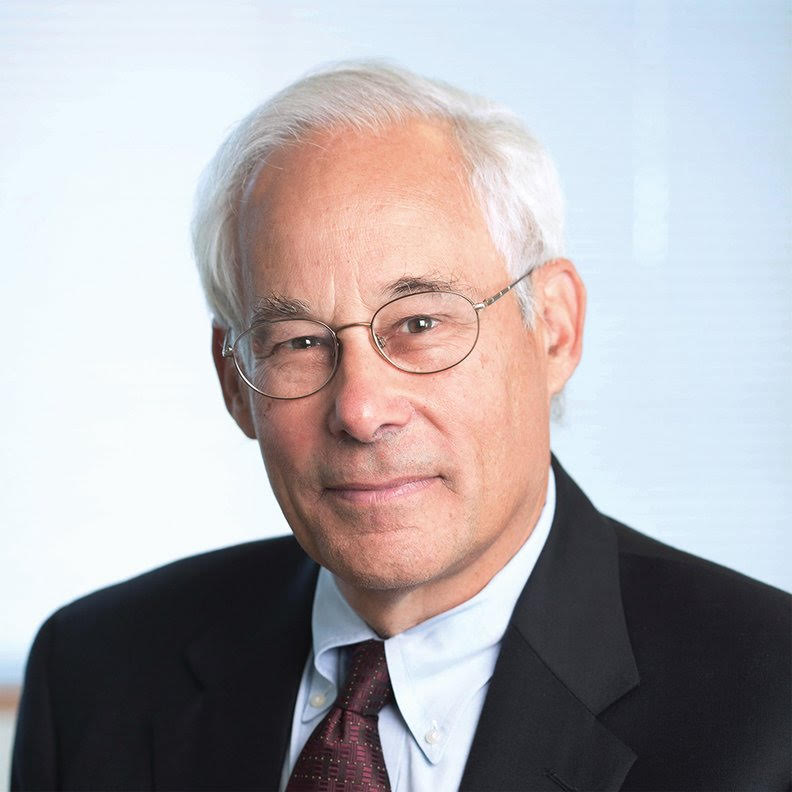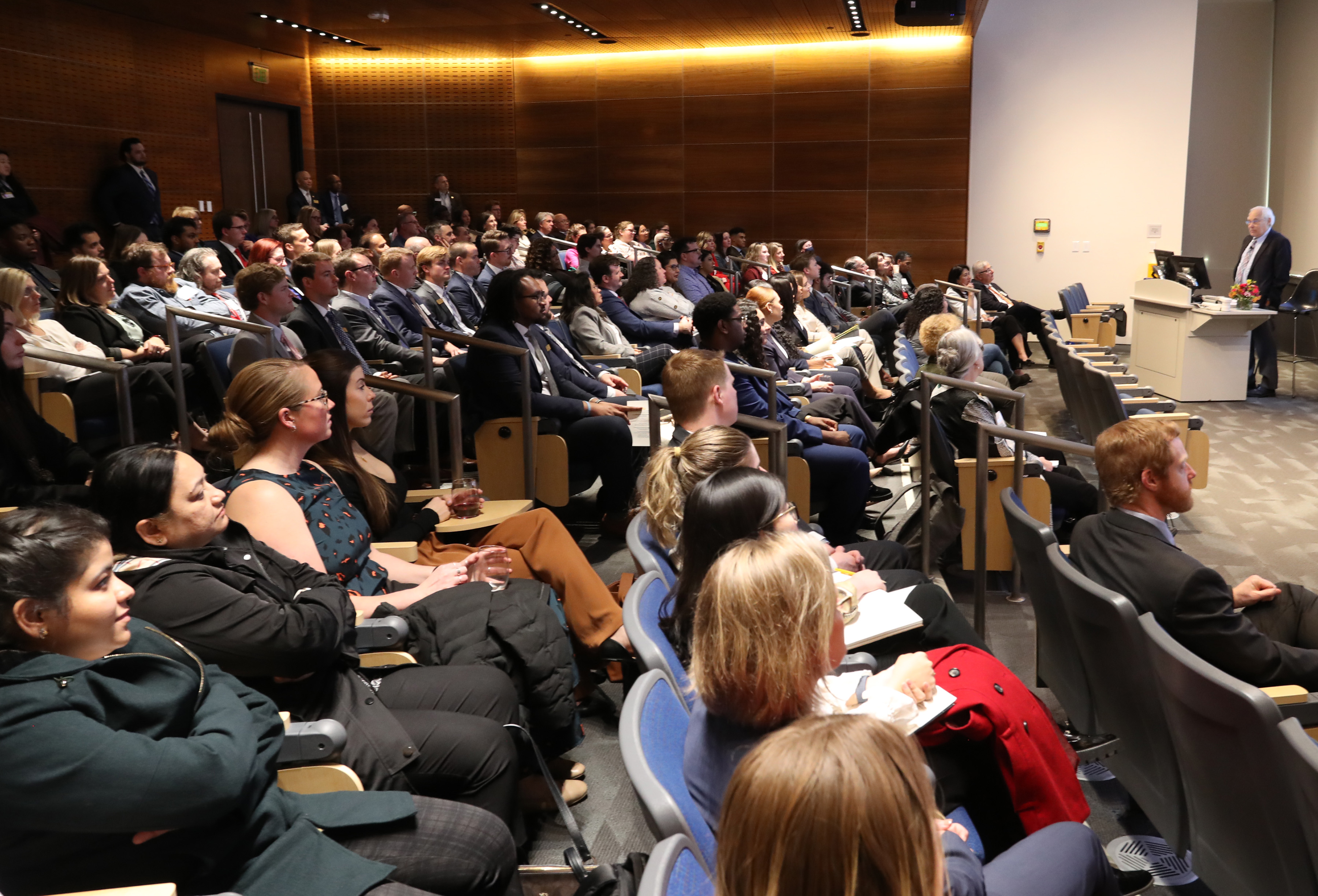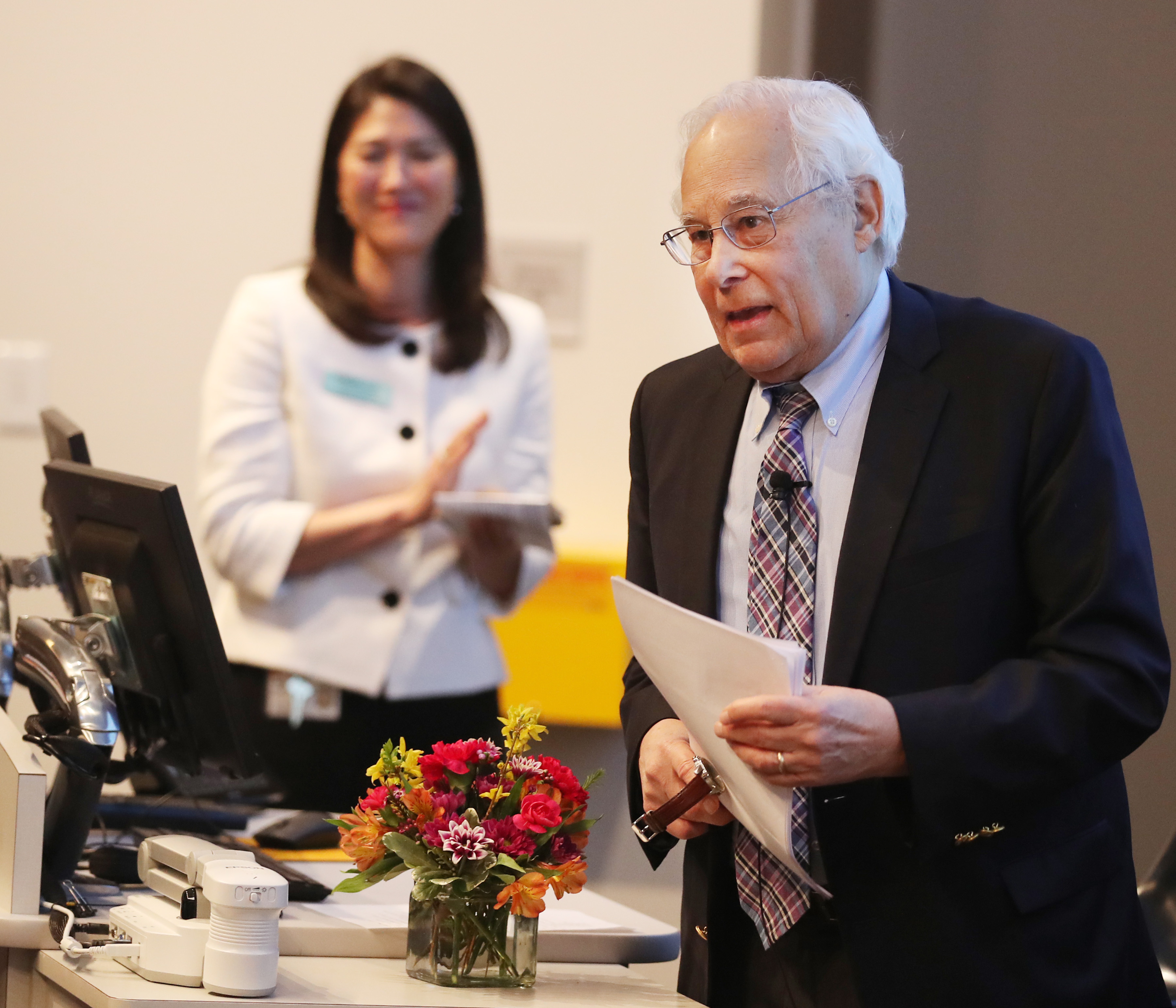Parrott Lecture series speaker offers rebuke of major U.S. health care players
Don Berwick, M.D., M.P.P., renowned leader in health care quality and cost control, underscores importance of collaborative efforts in addressing population health issues – and those he believes are holding it back
 Donald M. Berwick, M.D., M.P.P., did not mince words on the current state of U.S. health care.
Donald M. Berwick, M.D., M.P.P., did not mince words on the current state of U.S. health care.
"For the first time in history, overall life expectancy has fallen in this country. There's never been an era where I could have said that," said Berwick, a longstanding member of the Harvard Medical School faculty and former administrator of the Centers for Medicare and Medicaid Services appointed by President Barack Obama.
"Now, we're seeing a tipping point,” where ignoring the social determinants of health such as safe neighborhoods, job opportunities, access to food and quality education, and a lack of social and economic opportunities is taking its toll on the health of the most disadvantaged populations.
It was the foundation from which Berwick called out systems – and individual players – he believes are at the root of systemic issues in the health care system and society at large, urging for a reorientation towards values-driven policies and actions to promote health equity and well-being.
The sharp rebuke was presented to a packed auditorium of VCU Health Administration students, faculty, alumni, VCU and VCU Health leaders and guests at VCU College of Health Professions as part of the Jim and Sally Warden Parrott Lecture Series. Berwick, widely considered a visionary on a decades-long mission to enhance health care and patient safety, was the first Parrott lecturer since 2019 and delivered what attendees have come to expect of the endowed series.
“This isn’t just an event where we go through the motions to honor Jim. [It’s] about education and providing eye-opening takeaways about health care,” said Sally Parrott, who created the endowment with Virginia Premier in honor of her late husband, Jim Parrott. He died unexpectedly in 2015 and was CEO of Virginia Premier, a health plan once managed by VCU Health, and played a leading role in the company moving into managed care for Medicaid, the federal program serving low-income and disadvantaged populations.
Naming Names: Federal Programs, Pharma, Health Systems and Execs
 Berwick called Medicare Advantage "way out of whack." Also referred to as Medicare Part C, Medicare Advantage is offered by private companies that contract with Medicare to provide older adults with Part A and Part B benefits. These plans can include additional benefits, such as prescription drug coverage, vision, dental, and wellness programs, and may have different costs and rules compared to original Medicare.
Berwick called Medicare Advantage "way out of whack." Also referred to as Medicare Part C, Medicare Advantage is offered by private companies that contract with Medicare to provide older adults with Part A and Part B benefits. These plans can include additional benefits, such as prescription drug coverage, vision, dental, and wellness programs, and may have different costs and rules compared to original Medicare.
According to Berwick and cited research, recent estimates indicate overpayment of Medicare Advantage plans "for no value" by $83 billion this year, which amounts to $600 billion over the next six to eight years. Berwick conceded that some funding is reaching beneficiaries, however, "the vast majority [is going] to wealth, to the aggregation of wealth, toward the growth of stock values for investors and the growth of the financial well-being of some pretty well-heeled parts of our society."
He quickly pivoted to the pharmaceutical industry: "Drug companies, thank God they're there. They save lives every day, but they are just out of control compared to any other nation on earth in terms of pricing."
"I could spend far more than the rest of the time I have showing you these inequities in costs. It's happening in the hospital sector. Our hospitals are jacking prices up because they can," Berwick said. "They're doing it through mechanisms, gaming regulations and through concentration of market power."
He cited issues with inpatient versus outpatient care billing and the 340B Drug Pricing Program, "which was originally intended by Congress to make sure hospitals that served poor people got an extra amount of money to work with, which has been now taken over by large hospital systems and the original intent completely destroyed. The consequences are cost increases."
Added Berwick: "A lot of it is personal wealth. It is an embarrassment, the way we have allowed compensation to rise. It isn't the cause, it's the manifestation [of] greed in a system that is now out of control." He directly mentioned health care giant UnitedHealthcare and its CEO's eight-figure compensation package.
Oak Street Health and other companies backed by private equity are favoring their bottom line and investor returns over the health of patients, he said.
"The consequences for the public are anti-health," Berwick said. "There are over 100 million people in the United States who carry medical debt today. Understand no other nation, no other developed nation, no wealthy nation on Earth could make anything like that statement. When you go to people with medical debt and ask what they're doing about it, they’re cutting. They're cutting food, they're cutting clothing, they're eradicating their savings."
"We are not working on health. We're not investing in children in their early years. We're not investing in education that's available to all. We're not investing in fair conditions for workers. We're not investing in rational elder policy. And we're not investing in community infrastructures that support health and well-being,” he said. “What are we working on? Wealth."
Proposing Solutions with Measured Message for the Future
Berwick shared that it's time for clinicians and administrators to get back to the basics to support health for all, especially for patients from disadvantaged populations. Advocating for activities anchored in a morality to render health in society, Berwick presented his "Campaign for the Moral Determinants of Health."
His seven-point plan reflects a broader understanding of health that extends beyond clinical care to encompass social, economic, and political factors, emphasizing the importance of ethical principles and societal values in shaping health outcomes and disparities.
- Achieve U.S. Ratification of Major Human Rights Treaties: In the U.S., Berwick proposes ratifying basic human rights treaties, such as those pertaining to the rights of children, women and immigrants.
- Make Health care Unequivocally a Human Right in Our Nation: Berwick advocates for viewing health care as a fundamental human right and centralizing health care access and equity in society's values and policies.
- Restore American Leadership to Reverse Climate Change: Acknowledging climate change as a global health issue, he suggests that taking ownership and leadership in addressing climate change is essential for promoting health and well-being.
- Achieve Radical Reform of Our Nation's Criminal Justice System: Berwick highlights the need for reforming the criminal justice system to ensure that it promotes healing, equity, and social justice rather than perpetuating inequities and damage to individuals.
- End Policies of Exclusion and Achieve Compassionate Immigration Reform: Advocating for rational and compassionate immigration policies, Berwick emphasizes the importance of supporting migrants and their families to promote health and well-being both domestically and globally.
- End Hunger and Homelessness in Our Nation: Addressing social determinants of health, he calls for efforts to end hunger and homelessness, recognizing their significant impacts on individual and community health.
- Assure Voting Rights and the Integrity of Democratic Institutions: Viewing voting rights as a health status issue, Berwick underscores the importance of protecting voting rights to ensure that voices of the people are heard and represented in policy decisions affecting health and well-being.
"I think we have to go back to why we're here, and what we wish to do in order to recruit the energy to put our resources where they really may generate health," Berwick said.
"I don’t know if we can do it,” he said. “But I know what'll happen if we don’t."
Parrott and College of Health Professions Embark on a New Chapter
 Don Berwick, M.D., M.P.P., renowned leader in health care quality and cost control, delivers Parrott Lecture.
Don Berwick, M.D., M.P.P., renowned leader in health care quality and cost control, delivers Parrott Lecture.
With Sally Parrott joining in via Zoom, Paula Song, Ph.D., the College’s interim dean and the Richard M. Bracken Chair and Professor of Health Administration, closed the session with an announcement: Dr. Berwick will serve as the last speaker in the Jim and Sally Warden Parrott Lecture series, which began in 2017.
The endowment will transition to serve the VCU community in a new way – taking on a new chapter as a student scholarship. Additional details will be announced by Sally and the College of Health Professions at a later date.
"I can think of no better way to continue Jim's legacy, his passion and interests to supporting the health of vulnerable populations than through investing in our future," Song said.